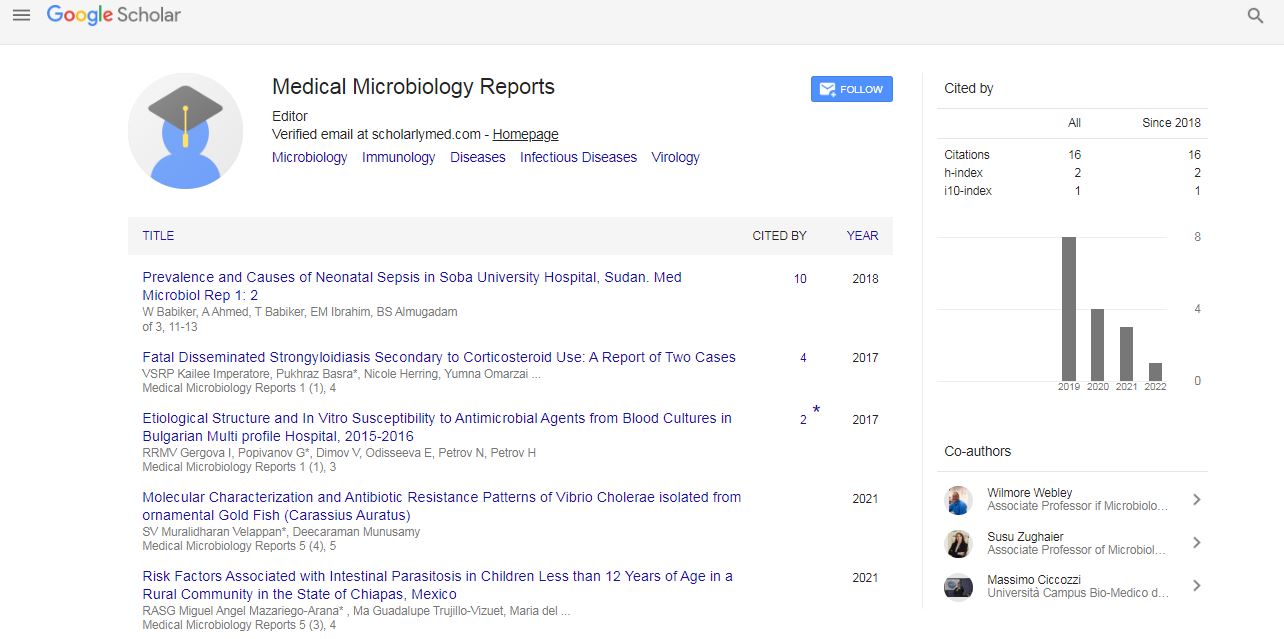Opinion Article, Med Microbiol Rep Vol: 7 Issue: 1
Intestinal Parasitosis: A Silent Threat to Global Health
Schwebke Jandu*Department of Medicine, Yale University School of Medicine, New Haven, Connecticut, USA
*Corresponding Author: Schwebke Jandu
Department of Medicine, Yale
University School of Medicine
New Haven, Connecticut, USA
E-mail: Jandusch951@gmail.com
Received date: 27 February, 2023, Manuscript No. MMR-23-93353;
Editor assigned date: 01 March, 2023, PreQC No. MMR-23-93353(PQ);
Reviewed date: 15 March, 2023, QCNo MMR-23-93353;
Revised date: 22 March 2023, Manuscript No. MMR-23-93353(R);
Published date: 31 March 2023 DOI: 10.4172/MMR.1000326.
Citation: Jandu S (2023) Intestinal Parasitosis: A Silent Threat to Global Health. Med Microbiol Rep 7:1.
Description
Intestinal parasitosis is a common but often overlooked health problem that affects millions of people worldwide, particularly in developing countries. It is caused by a wide range of parasitic organisms that infect the human intestine, causing a variety of symptoms ranging from mild discomfort to life-threatening illness. This study explores the prevalence, causes, and consequences of intestinal parasitosis, as well as current methods of prevention and treatment. The study also discusses the challenges and opportunities for controlling this global health threat.
Intestinal parasitosis is a global health problem that affects millions of people worldwide, particularly in developing countries. It is caused by a wide range of parasitic organisms that infect the human intestine, causing a variety of symptoms ranging from mild discomfort to lifethreatening illness. Despite its prevalence, intestinal parasitosis is often overlooked, and its impact on global health is not fully recognized. This study aims to raise awareness about this silent threat to global health and to explore the current methods of prevention and treatment.
Prevalence of intestinal parasitosis
Intestinal parasitosis is most prevalent in developing countries, where poor sanitation and hygiene practices are common. It is estimated that more than one billion people worldwide are infected with intestinal parasites, with the highest prevalence rates found in sub-Saharan Africa, South Asia, and Latin America. Children are particularly vulnerable to infection, with an estimated 300 million infected worldwide.
Causes of intestinal parasitosis
Intestinal parasitosis is caused by a wide range of parasitic organisms, including protozoa and helminths. The most common types of intestinal parasites include Giardia lamblia, Entamoeba histolytica, and Ascaris lumbricoides. These organisms are transmitted through contaminated food and water, poor hygiene practices, and close contact with infected individuals.
Consequences of intestinal parasitosis
Intestinal parasitosis can cause a range of symptoms, including diarrhea, abdominal pain, bloating, and malnutrition. In severe cases, it can lead to chronic illness, disability, and even death. Intestinal parasitosis also has a significant impact on economic development, with infected individuals often unable to work or attend school due to illness.
Prevention and treatment of intestinal parasitosis
Prevention of intestinal parasitosis involves improving sanitation and hygiene practices, including access to clean water and proper disposal of fecal matter. In addition, mass drug administration programs have been successful in reducing the prevalence of intestinal parasites in some areas. Treatment of intestinal parasitosis involves the use of antiparasitic drugs, such as metronidazole or albendazole, which can effectively destroy the parasites.
Challenges and opportunities for controlling intestinal parasitosis
Despite the availability of effective treatments, controlling intestinal parasitosis remains a significant challenge. One of the biggest obstacles is the lack of access to clean water and sanitation facilities in many parts of the world. In addition, drug resistance and the high cost of treatment pose significant challenges. However, there are also opportunities for controlling intestinal parasitosis, including the development of new drugs and vaccines, as well as the implementation of community-based interventions focused on improving sanitation and hygiene practices.
Conclusion
Intestinal parasitosis is a silent threat to global health that affects millions of people worldwide, particularly in developing countries. It is caused by a wide range of parasitic organisms and can cause a variety of symptoms ranging from mild discomfort to life-threatening illness. Prevention and treatment of intestinal parasitosis involve improving sanitation and hygiene practices, as well as the use of antiparasitic drugs. While there are significant challenges to controlling intestinal parasitosis, there are also opportunities for overcome the diseases through many ways.
 Spanish
Spanish  Chinese
Chinese  Russian
Russian  German
German  French
French  Japanese
Japanese  Portuguese
Portuguese  Hindi
Hindi 
